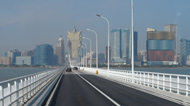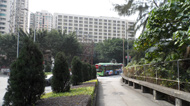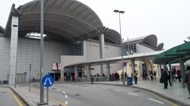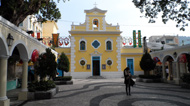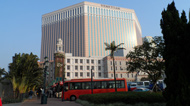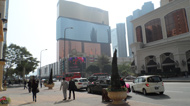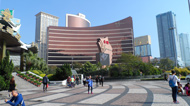Governador Nobre de Carvalho
 |
MACAO
According to the World Factbook, Macao has the second highest life expectation among all the world nations. Furthermore, Macao is one of the few regions in Asia with a high ratio of human development (with Norway which boasts the highest position).
Concerning the name Macao, it seems it comes from the temple dedicated to Mage (媽閣; cantonese: Magok, pinyin: māgé) built in 1448 for the godess Matsu. In China the town is known as Àomén (澳门). Other names are: Haojing'ao (壕鏡澳), Xiangshan'ao (香山澳) e Liandao (蓮島). Macao is the portuguese name. At present the official name of this zone is 中华人民共和国澳门特别行政区 Zhonghua Renmin Gongheguo Aomen Tebie Xingzhengqu (Special Administrative zone of Macao of the Popular Chinese Republic).
It became a portuguese colony in 1557 and was recognized like that by China in 1670. During the XVII century the Dutch tried many times to conquer it. After the Spanish period, Portugal regained the independence under the Braganza in 1640 and, since for all the "spanish" period, Macao considered itself always subject to Portugal, and was given the official title of Cidade do Nome de Deus, de Macau, Não há outra mais Leal (town on behalf of God, Macao, no other more loyal). After the british conquest of Hong Kong, the importance of Macao as commercial centre, declined more and more. It became the departure base of the jesuits' missions to the China of Ming and centre of the tringular trade of silver and bronze between Japan and China, countries which did not have direct commercial relations and that benefited of a completely different exchange rate. This allowed its economical take-off. It was also a refuge for thousand of Japanese converted to Catholicism after the beginning of the persecutions. Many of them were part of the workers that erected the Saint Paul cathedral, of which today we can see only the facade. On 11th, June 1951, Macao was raised from the stutus of a colony to the one of an overseas territory. Portugal actually started to lose the sovereignty over Macao from the Great Chinese Cultural Revolution at the end of 1966, when a controversy concerning the closing of a school brought to violent demonstrations against the portuguese authority and the administration abdicated to its supreme authority. On 29th, January 1967 Portugal officially recognized Macao as Chinese territory and, even if China declined the offer for its official return under its sovereignty, Macao virtually passed under the Chinese influence: no important decision would have been taken without agreement with China. Ho Yin, chief of the Chinese Chamber of commerce in Macao, became the unofficial representative of Pekin. After the fall of the salazarist regime in Portugal, on 25th, April 1974, China again refused the return of Macao, and in 1975 the small military contingent was withdrawn. On 17th, February 1976 the new Constitution declared Macao as a special Chinese territory with Portuguese administration, and the concept of temporary administration was reaffirmed on 8th, February 1979, after the restoration of the diplomatic relations between China and Portugal. In that occasion Portugal took again the total sovereignty over Macao reintroducing the concept of Overseas Portuguese Territory. The Chinese-Portuguese agreement on 26th, March 1987, foresaw the final return of Macao to China and the official handing-over would have occured at midnight on 20th, December 1999. So Macao after 442 years of Portuguese control went back to the Chinese sovereignty. In the joined declaration it has been stipulated that Macao will keep however an elevated level of independence till 2049, therefore till 50 years after this transfer.
The peninsula of Macao is located 60 Km. south-west of Hong Kong and 145 Km. from Canton. Furthermore, it has 41 Km. of coast, but has only 310 meters of land border with Guangdong. The peninsula consists of the Peninsula of Macao itself and of the islands Taipa and Coloane, which are now connected to form the Cotai stripe. The peninsula consists of an estuary of the Pearls river on the east and of Xi Jiang river on the west. It is near the borders of the Special Economic Zone of Zhuhai in China. The main border between Macao and China is known as Portas do Cerco on the side of Macao, and the port Gongbei on the side of Zhuhai. The peninsula of Macao was in origin an island, but the sandbank which connected it, gradually trasformed into a narrow isthmus. The reclamations carried out in the XVII century transformed Macao into a peninsula with a generally flat ground, even if some stiff hills still mark the original conformation of the territory. Alto of Coloane is the highest point in Macao, with a height of 170,6 meters. With a high density urban environment, Macao does not have countryside, pastures, forests or woods. Macao has a humid subtropical climate with a relative humidity between 75% and 90%. As in the larger part in the south of China, the seasonal climate is strongly influenced by the monsoons and the differences of temperature and humidity between summer and winter are evident, even if not like the inland of China. The average annual temperature in Macao is 22,7 °C. July is the hottest month, with an average temperature of 28,9 °C. The coldest month is January, with an average temperature of 14,5 °C. Located on the southern coast of China, Macao has plenty of rains, with an average annual rainfall of 2.120 mm.. Yet, the winter is mostly dry due to the influence of the Russian-Syberian anticyclone that hits most of the oriental Asia. Autumn in Macao, which is from Oktober to November, is sunny and still pleasantly hot with a low humidity. Winter (from December to beginning of March) is generally mild with temperatures higher than 13 °C most of the time, even if they can fall under 8 ° C. The humidity starts to increase from the end of March. The summer is very hot, with temperatures that often are higher than 30 °C during the day. The heat is sometimes followed by strong rains, thunderstorms and occasionally typhoons.
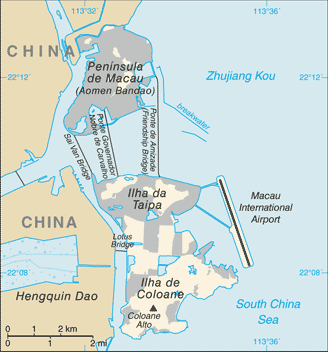 |
The taxi from the airport to the hotel Regency costs about 50/55 MOP and takes about 15'. Buses (22, 33, 25X) stop in front of the hotel and go to the north or to the south. The ticket costs 3,60 - 4,20 - 5,00 MOP according to the destination, and it is necessary to enter the bus with the right amount of money: the driver does not give change. There is also the night bus. To reach the biggest hotels it is possible to use free shuttle buses that are at the disposal of the potential casino players. From the border in the north, the hotel shuttle buses leave continuously (Galaxy, MGM, Venetian, Lynn, etc.) bringing, free of charge, the Chinese that come to gamble in Macao.
A good portuguese restaurant is Caniço in Taipa (bus n° 25, 30, 33). For dinner the average amount for two persons is about 300/350 MOP including the wine.
It is possible to reach Hong Kong easily by hydrofoils that leave very frequently during t he day, every half hour (Macau Maritime Ferry Terminal - Outer Harbour) or by helicopter (the only company is the SKY SHUTTLE. A one way ticket, 15', costs HKD 4.100, € 460,00). The hydrofoil takes an hour and costs 166 MOP (€ 18,00) per person single ticket economy class. There are three shipping companies: Turbo Jet, Cotai Water Jet and CKS ferries.
Currency in Macao: Macao Pataca (MOP)
Exchange rate on the
05th, January 2015: 1 € = 9,49 MOP
Hourly difference with Italy: + 7 hours (solar time)
